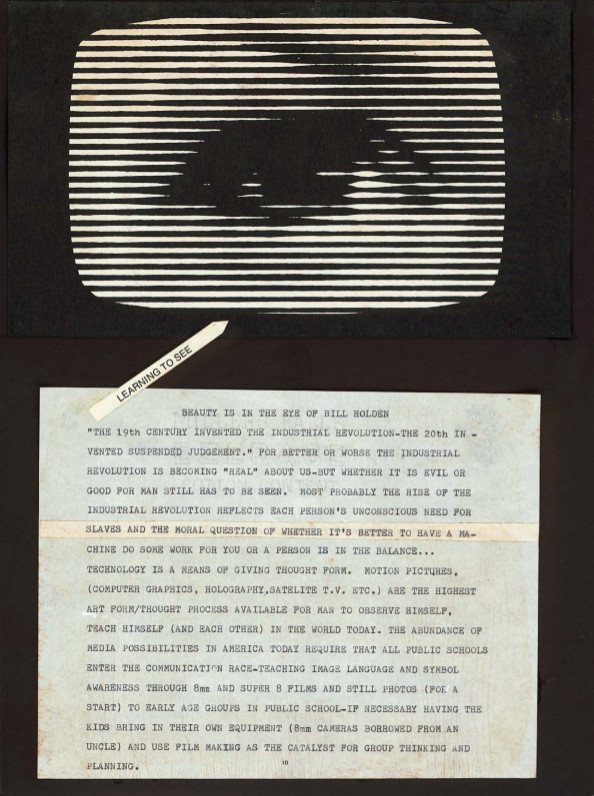Stan VanDerBeek: Violence Sonata / The History of Violence in America (1970)
Filed under artist publishing | Tags: · art, collage, education, machine, mass media, media, participation, performance, technology, television, violence

Stan VanDerBeek was part of the “Rockefeller Artists-in-Television” residency program at Boston public television station WGBH from 1969–1970, during which time he produced the simulcast television program Violence Sonata. The program, directed by David Atwood and Fred Barzyk, was transmitted simultaneously on both Channels 2 and 44 on January 12, 1970, with the suggestion that viewers place two television sets side-by-side. Following sonata form, the piece is composed of three segments: “Man,” “Man to Woman,” and “Man to Man.” The simultaneous broadcast consisted of material VanDerBeek composed from previous films, archival and newsreel footage, video shot in Boston for the show, and filmed collages, further manipulated and enhanced through overlays and color saturation. Sections of the broadcast were played before a live studio audience, with actors also performing a play written by VanDerBeek for the show. Home viewers were encouraged to call in their responses to the program between the acts. The series of collages entitled The History of Violence in America was conceived as layouts for reproduction and publication in a booklet to accompany the broadcast.
Commentary: Melissa Ragain (X-TRA, 2012).
Video excerpt (Violence Sonata)
PDF (Violence Sonata – script, photo documentation, sketches, collages, reviews)
PDF (The History of Violence in America, 22 pages)
John Seely Brown, Paul Duguid: The Social Life of Information (2000)
Filed under book | Tags: · botnet, business, economy, information, knowledge, management, technology

“Drawing from recent research and practical examples across a range of organizations, The Social Life of Information dispels many of the futurists’ sweeping predictions that information technology will obliterate the need for everything from travel to supermarkets to business organizations to social life itself. The authors examine the potential and limitations of technology with regard to intelligent software agents, the automated home office, business reorganization for innovation, knowledge management and work practices, the paperless society, and the digital university. Arguing eloquently for the important role human sociability plays in the world of bits, Brown and Duguid present an optimistic look beyond the simplicities of information and individuals. They show how a better understanding of the contribution that communities, organizations, and institutions make to learning, knowledge, and judgment can lead to the richest possible use of technology in our work and everyday lives.”
Publisher Harvard Business Press, 2000
ISBN 0875847625, 9780875847627
256 pages
Andrew Barry: Political Machines: Governing a Technological Society (2001)
Filed under book | Tags: · citizenship, european union, governance, intellectual property, interactivity, neoliberalism, networks, politics, society, sociology of science, technology

Technology assumes a remarkable importance in contemporary political life. Today, politicians and intellectuals extol the virtues of networking, interactivity and feedback, and stress the importance of new media and biotechnologies for economic development and political innovation. Measures of intellectual productivity and property play an increasingly critical part in assessments of the competitiveness of firms, universities and nation-states. At the same time, contemporary radical politics has come to raise questions about the political preoccupation with technical progress, while also developing a certain degree of technical sophistication itself.
In a series of in-depth analyses of topics ranging from environmental protest to intellectual property law, and from interactive science centres to the European Union, this book interrogates the politics of the technological society. Critical of the form and intensity of the contemporary preoccupation with new technology, Political Machines opens up a space for thinking the relation between technical innovation and political inventiveness.
Publisher Continuum International Publishing Group, 2001
ISBN 0485006340, 9780485006346
320 pages
PDF (no OCR)
Comment (1)
